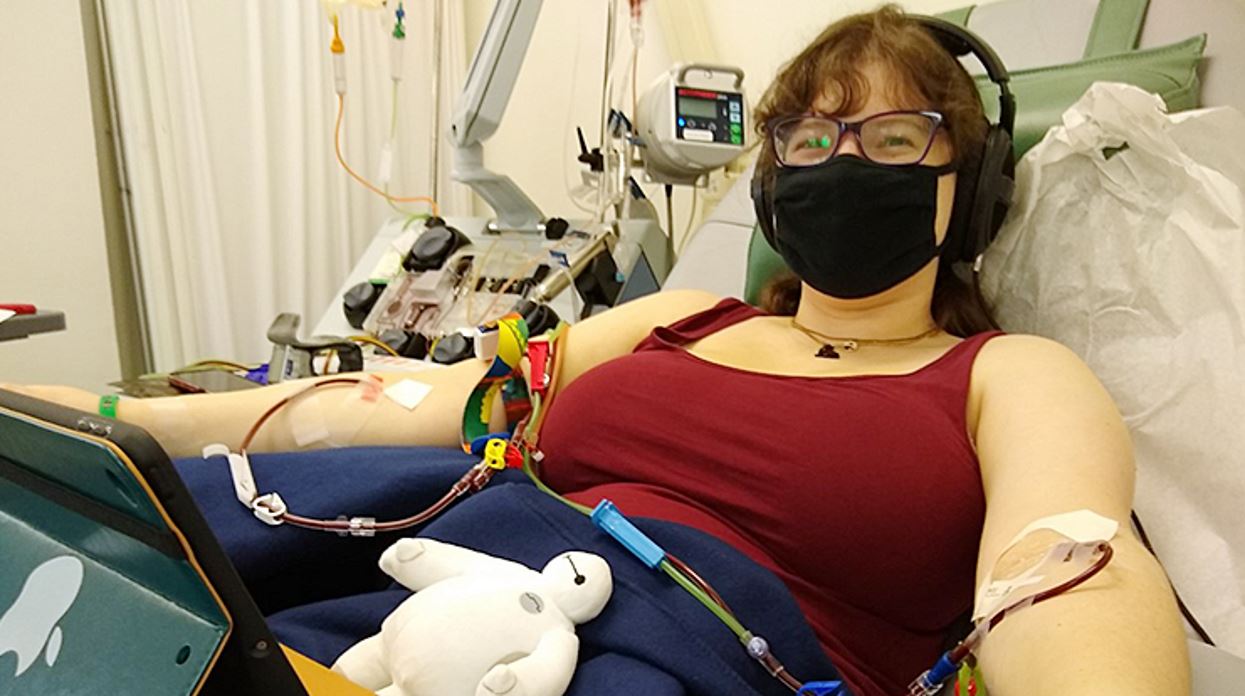
A Selfless Act: Dental Hygiene Student Donates Stem Cells to Patient in Need

Allison Leader, Bachelor of Science in Dental Hygiene, Fast Track '21, completed a peripheral blood stem cell transplant through Be the Match.
In 2018, Allison Leader saw an online ad for Be the Match, one of the largest coordinators for the National Bone Marrow Registry. She thought of the Stem Cell Biology class she took as an undergraduate at UMass Lowell, where she was a biology major, and remembered how she’d learned about bone marrow transplantation. She recalled thinking at the time, “Huh, that’s a cool thing my body could hypothetically do” for someone. So she signed up for the Be the Match registry and received a genetic testing kit, swabbed her cheek, and mailed back her sample.
Two years later, she got an email.
Allison, by this point a student a student at the MCPHS Forsyth School of Dental Hygiene (Allison’s father is a dentist who was both taught by and taught with Esther Wilkins, for whom the MCPHS dental hygiene clinic is named. She says he felt very strongly that, “If a daughter of mine is going to be a dental hygienist, then she has to go to Forsyth!”), was a close genetic match for a leukemia patient in need of a bone marrow transplant. The process of confirming that she was the best donor candidate was quite exhaustive, however. Allison received a package with four more swabs to do, and then gave an extensive health history interview. She heard back in about two weeks that she was the best match for the person, then had yet another long health history interview. Once that was done, she was sent to an urgent care clinic to give over a dozen blood samples—Allison says she gave over a half a cup of blood in this screening stage alone.
All Allison knew about her donor match was that it was a woman in her mid-twenties. People needing these transplants often suffer from blood cancer and have been in and out of remission. They go through harsh chemotherapy that clears out their existing bone marrow, and the stem cells from their donor will repopulate that bone marrow. And the transplant process itself is also a very harsh procedure. Says Allison, “People keep saying to me, ‘Oh, Allison, you’re doing this amazing thing,’ but my part’s the easy part.”
For four days leading up to the donation process, which took place in early November, at the New York Blood Center in Manhattan, Allison received Injections of a medicine to make her bone marrow more active; it was best for her to have lots of white blood cells and stem cells in her blood to donate. The process itself is called peripheral blood stem cell donation: it’s like a direct bone marrow donation but less invasive. During the donation, the donor is hooked up to a machine that separates out blood cells by centrifuge in a process called apheresis. Stem cells are collected, and then the rest of the donor’s blood is rehomogenized and circulated back through her. The result is a collection of bags of stem cells to give to the patient in need.
Ordinarily it takes a few hours. But Allison’s process was dragged out: “It was kind of a long day since I apparently have very small veins,” she says. “I was hooked up for about eight hours.” Allison says it was not too uncomfortable—she was able to watch movies on her iPad—but the long process was tiring, and she did get cranky enough to demand chicken fingers from her boyfriend, who had accompanied her on the trip to New York. But she wants to spread awareness for Be the Match and to let people know a donation is worth considering.
Most of her friends and acquaintances knew very little about the process she was about to undergo, but Allison says they mostly assumed it would take her out of commission for months. She wants to dispel that notion, to raise awareness for Be the Match and to share that the experience of donating is not so bad. She’s certainly glad she did it. “It was an easy decision to make,” she says.
More University News
This is MCPHS: ‘Everybody Here is Like a Family’
An accelerated PharmD student finds confidence, connection, and her place in Manchester.
This is MCPHS: ‘It’s Really Motivating When You Find the Thing That’s Right for You’
Health Sciences major Emma Borkosky shares her thoughts on getting involved on campus and the formative experiences that shaped her journey into occupational therapy.
Forsyth Dental Hygiene Students Provide Free Dental Care to Hundreds in Rhode Island
Students will volunteer again at the Massachusetts Mission of Mercy event in Worcester in November
Diagnosis on Day One: Inside a PA Student’s Clinical Rotation Experience
During the final year of her education, physician assistant studies student Emily Brenman is putting her knowledge to the test as she treats patients for the first time.

